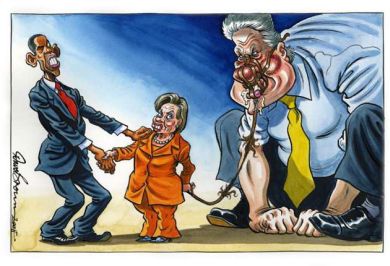
† [The Independent, U.K.]
Novosti,
Russia
The Military
Landscape that Confronts Obama
"Overall, the situation in the
world is unlikely to become any less tense. The global economic crisis has only
just begun, and as it deepens further, it may seriously affect the political
plans of the leading powers."
By Military Affairs Analyst Ilya Kramnik
Translated By Igor Medvedev
December 2, 2008
Russia
- Novosti - Original Article (Russian)
MOSCOW: The new U.S. administrationís
coming to power against the backdrop of a growing global economic crisis and
ongoing conflicts in a number of "hot spots" forces one to grapple
with the question of how the military policies of the new [Obama] cabinet will
compare to the old. What conflicts can be halted, and which ones may in fact
flare with Obamaís entry into office? And in general, how will the
international situation actually change?
To understand how U.S. military
policies might change, one needs to observe those who will implement them. At
first glance, Barack Obama isn't carrying out any radical changes, keeping
Robert Gates as secretary of defense, which shows that, in principal, Obama
agrees with the development of America's armed forces over recent years.
General James Jonesí [ret.]
appointment as national security adviser to the new cabinet is also
interesting. The four-star general, former commander of the U.S. Marine Corps,
commander of U.S. forces in Europe and commander of joint NATO forces in
Europe, is a supporter of the global reach of the alliance. By these
appointments, one can clearly assert that the U.S. will not suspend hostilities
"across the board." Nevertheless, a number of theaters will certainly
see major changes. What will these be?
One of Obama's central
election promises was to withdraw U.S. forces from Iraq. Now the plan is to
pull them out within 16 months. However, one can hardly expect this to bring
the conflict in that country to an end. The absence of the dominant
military-political force in Iraq will not allow any of the parties to Iraq's
civil war to quickly consolidate the country under its authority, which means
the conflict is likely to linger on. Thus the United States is likely to
continue to support the establishment of a regime in Iraq and to equip and
supply its armed forces, which will give the country some semblance of unity.
The conflict in Afghanistan,
by contrast, is bound to intensify. As Obama said himself, "The fight
against terrorism in Afghanistan will remain a priority for Washington."
The Pentagon has already announced a planned increase of troops in Afghanistan
- to over 50,000. However, by getting more and more involved in the Afghan
conflict, the United States is at risk of getting mired there the way the USSR
once did, as it tries to eliminate more and more enemy groups. It's possible
that the U.S. will try to "Afghanize" the
conflict - that is, put the primary burden on the Afghan Army - but the entire experience
of the Afghan War would have to lead one to view this option with pessimism.
The continued presence of
U.S. forces on Afghan territory has noticeably irritated even the
Washington-backed government of Hamid Karzai. In the event that tensions between the U.S. and the
current government of Afghanistan deepen, the possibility of a change of
government to one more loyal cannot be excluded, as was done years ago, for
example, in Vietnam.
Iran will probably remain on
the list of priorities, but under the circumstances, the United States is
unlikely to unleash a new war in the region. One can expect pressure to be
exerted on Iran from within by backing the forces opposed to the current
government.

BARACK AND HILLARY
[The
Telegraph, U.K.]
The U.S. is also likely to
concentrate on areas of the former USSR, especially the Black Sea zone,
including Ukraine, southern Russia and the Caucasus. Here, much depends on the
outcome of NATO foreign ministers meeting now being held in Brussels. The U.S.
seeks at all costs to achieve Ukrainian and Georgian membership in the alliance;
but in Europe, this position is unconditionally supported only by Poland and
the Baltic countries, while the original NATO members either adamantly oppose
this or feel that the time for such a step has yet to arrive.
It is highly unlikely that
Ukraine and Georgia will join NATO in the near future, but the risk of a new
Russia-Georgia conflict remains high. The activities of Ukraine and the U.S.
are also cause for concern, such as the transfer of Ukrainian troops to its
eastern and southeastern borders and Washington's decision to protect Ukrainian
vessels in the Black Sea zone against potential military risk.
But if such a conflict
doesn't break out before the changing of the guard at the White House (Obama
takes office January 20), the likelihood of a significant flare-up will become
much less likely. The last thing the new administration needs is a new war
between Russia and Georgia, let alone a war that involves Ukraine. But in any
case, Washington will continue helping these countries enter NATO and will
likely continue deploying the U.S. anti-missile defense system in Eastern
Europe.†
Posted by
WORLDMEETS.US
And don't expect open warfare
to break out in other parts of the world. For the past few decades, the
cabinets of Democratic administrations have preferred undermining potential
enemies from within by backing pro-U.S. forces. For
example, in Venezuela, Washington is most likely to back anti-Chavez forces and
gorge them with money, but at the same time refrain from direct intervention.
Overall, the situation in the
world is unlikely to become any less tense. The global economic crisis has only
just begun, and as it deepens further, it may seriously affect the political
plans of the leading powers.
CLICK HERE FOR RUSSIAN
VERSION
[Posted by
WORLDMEETS.US December 2, 10:55pm]